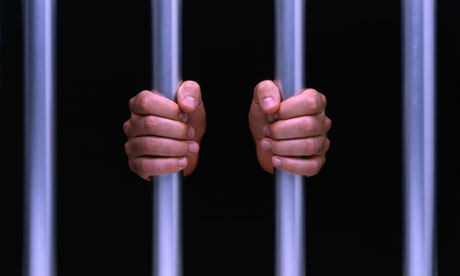Fears for China's shuanggui detainees after Wenzhou official dies
Many detainees under notoriously harsh form of extralegal detention in China claim to have been subjected to torture
Jonathan Kaiman in Beijing
guardian.co.uk, Friday 12 April 2013 08.18 BST

China's shuanggui detainees, bereft of legal protection, are vulnerable to human rights abuses, say critics. Photograph: Vincent O'Byrne/Alamy
Mrs Wu's nightmare began last month as she waited to pick up her husband at the airport. Yu Qiyi was flying back to his home city of Wenzhou from Beijing, where he had completed a temporary political post. Yet soon after he landed, Yu called to say a friend would collect him instead. "Another voice on the phone said I should go home," Wu told Chinese state media, which did not reveal her full name.
Wu did not see her husband until 9 April, 38 days later, when a doctor at a local hospital pronounced him dead. According to China's official Xinhua news agency, 41-year-old Yu, chief engineer of the state-owned Wenzhou Industry Investment Group, spent the interim in shuanggui, a notoriously harsh form of extralegal detention for Communist party officials who are suspected of corruption.
Local government authorities ruled Yu's death was accidental. Yet grisly pictures on Xinhua's website show a shirtless man covered in purple splotches lying on a hospital bed, his left arm awkwardly splayed across his chest. The article did not explain why he had been detained.
Critics say shuanggui detainees, bereft of legal protection, are particularly vulnerable to human rights abuses. According to Flora Sapio, a law professor at the University of Hong Kong who has written a book on the subject, Xinhua's sympathetic coverage could represent a high-level decision to begin addressing the rights of detainees while leaving the system fundamentally unchanged.
"What they're trying to do is get people in the system to treat criminal suspects in a different way," she said. "At the same time you, as the party state, want to be the only voice with the power to talk on matters of justice."
The vast majority of shuanggui detainees stand no chance of rescuing their careers and many kill themselves in detention. Most cases are eventually transferred to the judiciary, where they usually end in death sentences or long imprisonments. Bo Xilai, the disgraced Chongqing party chief, spent 10 months under such detention before his case was sent to the courts in January. He has yet to be formally tried.
"There have been reports of psychological manipulation and physical torture during [shuanggui] detention and interrogation, such as sleep deprivation, simulated drowning, burning the detainee's skin with cigarettes, and beating," said a report in the Hong-Kong-based Dui Hua Human Rights Journal.
According to the Beijing Times, 20 Swat police officers were dispatched to transport Yu's remains to a crematorium, despite the resistance of family members – medical records, they insisted, showed that the engineer had drowned.
"The doctor who tried to revive him said he was already on the brink of death when he was brought over," said Wu. "Why would they wait until he was on the brink of death to bring him to the hospital?"
On 9 April, the deputy party secretary of the Wenzhou municipal party committee, Xu Yongmin, told reporters an "investigation committee is in the middle of an investigation, and has not yet reached a conclusion".
In recent years, officials have supplemented their reports of "accidental" prison deaths with a series of unlikely explanations. One man in 2009 ostensibly suffocated on his quilt while sleeping. Others have reportedly died from playing hide and seek, drinking boiled water, and having a nightmare.

